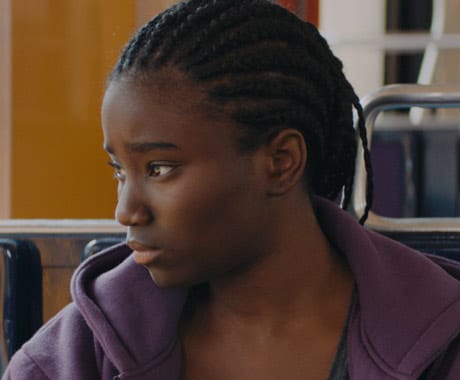Céline Sciamma, the French director that demonstrated such a keen aptitude for telling stories about gender politics exacerbated by adolescent anxieties with Water Lilies and Tomboy, has again crafted an intimate, yet troubling, tale of youthful alienation with Girlhood. While thematically similar, this tale of Marieme (Karidja Touré), a black high school student living in one of the rougher banlieues of Paris, is decidedly edgier. It starts in a recognizable place, with a diffident, confused protagonist at a crossroads, but winds up somewhere completely different.
Early on in Girlhood, Marieme learns that her grades aren't high enough to continue in regular high school. She's given the option of perusing some trade school pamphlets but, as someone already brimming with anxieties about identity below the surface, is deterred by the prospect of being different. In fact, most of Marieme's behaviour — captured impeccably by the expressive and smartly subtle Touré — is quite passive and reactive for the first half of the film. She manoeuvres through life safely, obeying the rules of her brother while avoiding any sort of defining decisions.
This makes her decision to join a small group of far more animated, and seemingly more confident, girls more of an act of assimilation and accessibility than one of empowerment. It's also a decision fuelled by the intrigue of getting closer to a boy who's forbidden to her, reiterating the inherent passivity of her unformed identity.
Sciamma continues this trajectory of survival through adaptability throughout. In embracing the nascent social acceptance of a less conventional group of girls, Marieme shoplifts, conducts herself inappropriately in shared public spaces and indulges in recreational drugs and in her otherwise dormant sexual appetite. She also starts to ignore familial obligations, alienating her brother while setting a poor example for her younger sister. But, in modifying her persona to fit in with the demographic she feels she's been relegated to, she's also able to act on some of the id impulses she'd repressed in the past. It's here that the film gives the sense that self-awareness stems from the wisdom gleaned from making mistakes.
Up to this point, the exchanges, though occasionally cruel and difficult to watch, have a natural, plausible flow. The actors are all exceptionally well cast and have a believable, kinetic dynamic that gives this story compelling propulsion. Unfortunately, Sciamma's didactics continue to remind us that the title is as deliberate as it is snarky, forcing Marieme's arc to a logical, albeit strained, extreme, in order to prove a thesis of femininity as fluid passive performance that's more specific to performing the surrounding culture than traditional female characteristics.
This need to push an already clear and viable agenda to a slightly indulgent degree of excess — once Marieme surpasses the moral lexicon of her newfound peer group — detracts from a rather effective and sincerely rendered narrative structure. It doesn't undo what precedes it in any sense and it certainly doesn't denigrate the evident magnetism of Touré or the directorial capabilities of Sciamma, but it does partially sully a story that would have been just as effective without the superfluous histrionics.
(Arte France)Early on in Girlhood, Marieme learns that her grades aren't high enough to continue in regular high school. She's given the option of perusing some trade school pamphlets but, as someone already brimming with anxieties about identity below the surface, is deterred by the prospect of being different. In fact, most of Marieme's behaviour — captured impeccably by the expressive and smartly subtle Touré — is quite passive and reactive for the first half of the film. She manoeuvres through life safely, obeying the rules of her brother while avoiding any sort of defining decisions.
This makes her decision to join a small group of far more animated, and seemingly more confident, girls more of an act of assimilation and accessibility than one of empowerment. It's also a decision fuelled by the intrigue of getting closer to a boy who's forbidden to her, reiterating the inherent passivity of her unformed identity.
Sciamma continues this trajectory of survival through adaptability throughout. In embracing the nascent social acceptance of a less conventional group of girls, Marieme shoplifts, conducts herself inappropriately in shared public spaces and indulges in recreational drugs and in her otherwise dormant sexual appetite. She also starts to ignore familial obligations, alienating her brother while setting a poor example for her younger sister. But, in modifying her persona to fit in with the demographic she feels she's been relegated to, she's also able to act on some of the id impulses she'd repressed in the past. It's here that the film gives the sense that self-awareness stems from the wisdom gleaned from making mistakes.
Up to this point, the exchanges, though occasionally cruel and difficult to watch, have a natural, plausible flow. The actors are all exceptionally well cast and have a believable, kinetic dynamic that gives this story compelling propulsion. Unfortunately, Sciamma's didactics continue to remind us that the title is as deliberate as it is snarky, forcing Marieme's arc to a logical, albeit strained, extreme, in order to prove a thesis of femininity as fluid passive performance that's more specific to performing the surrounding culture than traditional female characteristics.
This need to push an already clear and viable agenda to a slightly indulgent degree of excess — once Marieme surpasses the moral lexicon of her newfound peer group — detracts from a rather effective and sincerely rendered narrative structure. It doesn't undo what precedes it in any sense and it certainly doesn't denigrate the evident magnetism of Touré or the directorial capabilities of Sciamma, but it does partially sully a story that would have been just as effective without the superfluous histrionics.
